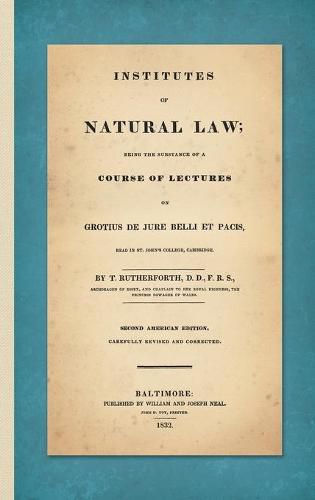Readings Newsletter
Become a Readings Member to make your shopping experience even easier.
Sign in or sign up for free!
You’re not far away from qualifying for FREE standard shipping within Australia
You’ve qualified for FREE standard shipping within Australia
The cart is loading…






This title is printed to order. This book may have been self-published. If so, we cannot guarantee the quality of the content. In the main most books will have gone through the editing process however some may not. We therefore suggest that you be aware of this before ordering this book. If in doubt check either the author or publisher’s details as we are unable to accept any returns unless they are faulty. Please contact us if you have any questions.
Influenced the Founders and Later Legal Authorities Including Pound, Story and Reid Originally published: Baltimore: Published by William and Joseph Neal, 1832. x, 596 pp. First published in England in 1754-1756, this exposition of natural law and De Jure Belli ac Pacis was one of the most important English treatises of the period. Reprinted in America in 1799, it was a standard text here for several decades. Reprint of the second American edition.
The founders found it advantageous to rely on his work during the creation and the ratification of the Constitution; the Institutes was frequently included in curricula during the early years of legal education; Rutherforth was routinely cited as authority in actual cases at bar, both in briefs and in opinions; and finally and most importantly Rutherforth greatly influenced the early American treatise writers such as James Kent, Henry Wheaton, David Hoff man, and especially Joseph Story. (…) Thomas Rutherforth’s Institutes of Natural Law is, in the end, best understood as a work of republican political theory. (…) His understanding of the nature and extent of interpretation was spelled out with great and convincing clarity. To a people committed both to the idea of man being governed by the laws of nature and of nature’s God, and the belief that a written constitution is one of the greatest improvements on political constitution, Rutherforth provided sound guidance. – Gary L. McDowell, 37 American Journal of Jurisprudence 59-60, 80 1992
THOMAS RUTHERFORTH [1712-1771] was an English moral philosopher, Regius Professor of divinity at Cambridge, and archdeacon of Essex.
$9.00 standard shipping within Australia
FREE standard shipping within Australia for orders over $100.00
Express & International shipping calculated at checkout
This title is printed to order. This book may have been self-published. If so, we cannot guarantee the quality of the content. In the main most books will have gone through the editing process however some may not. We therefore suggest that you be aware of this before ordering this book. If in doubt check either the author or publisher’s details as we are unable to accept any returns unless they are faulty. Please contact us if you have any questions.
Influenced the Founders and Later Legal Authorities Including Pound, Story and Reid Originally published: Baltimore: Published by William and Joseph Neal, 1832. x, 596 pp. First published in England in 1754-1756, this exposition of natural law and De Jure Belli ac Pacis was one of the most important English treatises of the period. Reprinted in America in 1799, it was a standard text here for several decades. Reprint of the second American edition.
The founders found it advantageous to rely on his work during the creation and the ratification of the Constitution; the Institutes was frequently included in curricula during the early years of legal education; Rutherforth was routinely cited as authority in actual cases at bar, both in briefs and in opinions; and finally and most importantly Rutherforth greatly influenced the early American treatise writers such as James Kent, Henry Wheaton, David Hoff man, and especially Joseph Story. (…) Thomas Rutherforth’s Institutes of Natural Law is, in the end, best understood as a work of republican political theory. (…) His understanding of the nature and extent of interpretation was spelled out with great and convincing clarity. To a people committed both to the idea of man being governed by the laws of nature and of nature’s God, and the belief that a written constitution is one of the greatest improvements on political constitution, Rutherforth provided sound guidance. – Gary L. McDowell, 37 American Journal of Jurisprudence 59-60, 80 1992
THOMAS RUTHERFORTH [1712-1771] was an English moral philosopher, Regius Professor of divinity at Cambridge, and archdeacon of Essex.